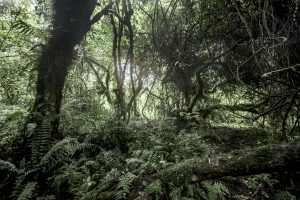‘Drums on the Night Air’ is a memoir about a year spent in the newly independent Congo in 1963 and ‘64. Patrice Lumumba, the democratically elected Prime Minister, had recently been assassinated and the country was in chaos. The palm olive plantation where we were living was close to Stanleyville, the location of Conrad’s Heart of darkness; it was also, Patrice Lumumba’s home land. My husband and I were unwittingly swept into a political tsunami culminating in a war in which all the white people living in Stanleyville were taken hostage. Pregnant and about to go into labour I had to flee a thousand miles with a small one-year-old in tow …
I can see it quite clearly. I am outside the store at Elizabetha. It is a dull brick building with a tin roof, part of a rash of European dwellings and offices scattered at random in a clearing of the plantation above the river. The heat lolls in an air heavy with moisture. In the distance I can hear a patter of drums. Twelve people are being lined up against the wall. Ten whites. Two blacks.
One of the whites is the Portuguese trader. He is a small man with a beer belly and bad teeth, but such spirit. It isn’t just his money and his colour that has made him a king; it is his sexual prowess. Even in extremis he carries himself with a certain swagger.
Then there are the nuns. I can barely bear to think of them. Fluttering, broken birds, this should be their chance to become martyrs, to return in triumph to their maker. But how can they hold their heads up when they have been violated? Wimples awry, they make a confused heap of black and white, like sea gulls found on an oil polluted beach.
The old planter and his wife are another thing. Vieux colons, old colonials. Living here so long they have become weather beaten, intertwined with one another and the jungle. They could face even this catastrophe with equanimity were it not for the child. That is the part that is unbearable. She should be at boarding school in Europe, but she is still young – too young for parents of their age. She arrived unplanned and has become so precious they cannot bear to part with her. One of the planter’s arms is crooked round her head, which he clasps to his chest, the other holds her body. All the captors can see is a neat back parting and two thick blond plaits. His wife stands beside him. She has grey hair neatly pulled back into a bun. Straight and still, she is, as she has always been, the rock in adversity.
In contrast the young planter, who lived down river, is in hysterics. He is a nouveau colon. He holds his two year old baby up at the rebels, shaking her and shouting hysterically, until he gets knocked in the mouth with a rifle and collapses in a heap. His young wife is already down on the ground. Mute with shock, she is on her knees, beyond reaction. She doesn’t even hear her baby crying any more. She lifts her head and a silent scream rips the air.
It is the black men, however, that I am most troubled about – not the rebels, they are drug-crazed, faceless extension of a gun – but the two Ghanaians. They have stirred up something more complicated than pure horror. I see them dressed, admittedly improbably, in torn suits and grubby ties. How else are we to know that they are ordinary business men caught up in a mess that has nothing to do with them? For the past few weeks they have been trying to escape through the jungle, sleeping beside the mosquito-infested river, hacking their way through the mangrove swamps. They speak no Lingala. Their limbs are stippled with sweat and the blood has drained from their faces, like the colour from a badly dyed garment, leaving a bleached mud. As far as they’re concerned these rebels, calling themselves Simbas, lions, are savages. Young men, barely into manhood, they are doped up with dagga and primitive superstitions. As soon as they were captured, the Ghanaians knew they were doomed. Not only are they foreigners in an alien country, but worse they are middle class businessmen, working for a European corporation. This makes them worse than white.
How could I ever have imagined that I could have got out of the Congo unscathed? That I could simply jet in, live a dream and jet out again? But then, come to think of it, I hadn’t. I’d wanted to be involved. Wanted to make a difference. What I hadn’t imagined was that none of it would turn out the way it did.

Veronica Cecil has described the Congo as “hot, claustrophobic, lawless, disturbing and beautiful”, and she conveys all these aspects in this compelling, often harrowing, memoir.
Fully in command of her subject, Cecil writes with considerable mastery, never descending into melodrama however dramatic the events which she describes. I found this a powerful and absorbing read and recommend it wholeheartedly.
This is a book which ranks alongside other such ‘Heart of Darkness‘ books as The Poisonwood Bible and Tim Butcher’s Blood River, and will prove invaluable to anyone wishing to understand more about the situation in the Congo today.
Review by: Mandy Jenkinson for newboooksmag.com